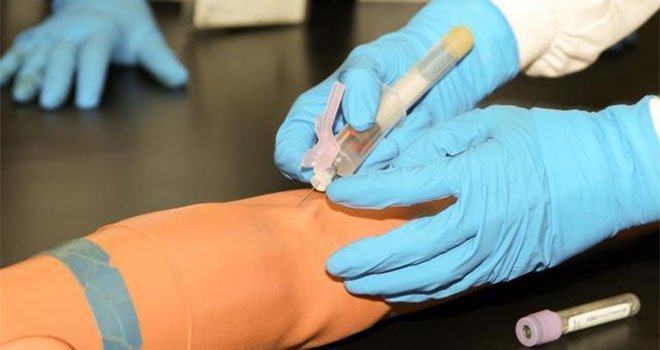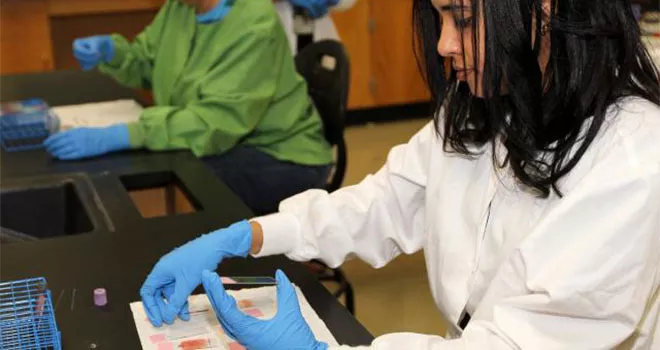Phlebotomy - Medical Laboratory Technician Certificate
Jumpstart your medical lab career with phlebotomy skills. Certified program, hands-on training, and job-ready in no time.
About the Phlebotomy Certificate
- Designed for phlebotomy trainees and newcomers to the medical laboratory technology field.
- Focuses on rapid acquisition of phlebotomy skills (drawing blood) and a comprehensive understanding of clinical laboratory areas, including specimen processing.
- Approved by the National Accrediting Agency for Clinical Laboratory Sciences.
- Graduates with a phlebotomy certificate are eligible to apply for the National Phlebotomy Registry examination through the American Society of Clinical Pathology.
Phlebotomy Certificate Details
Explore our Phlebotomy - Medical Laboratory Technician Certificate program. Gain vital lab skills, clinical insights, and career readiness.
After successfully completing this program, you will have the ability to:
- Explain the health care delivery system.
- Demonstrate accepted practices for infection control and safety.
- Identify basic elements of anatomy and physiology in relation to major areas of the clinical laboratory.
- Outline the importance of specimen collection and specimen integrity in the delivery of patient care.
- Identify collection equipment, various types of additives used, special precautions necessary and substances that can interfere in clinical analysis of blood constituents.
- Demonstrate successful venipunctures using proper operating procedures.
- Perform requisitioning, specimen transport and specimen processing in a clinical setting.
- Identify measures of quality assurance and quality control in phlebotomy.
- Communicate effectively using medical terminology.
View the Certificate Requirements to find out which courses and credits you'll need to earn your certificate.
Explore the Program Map to see how you can complete your certificate.

The applicant pool for programs in the School of Health Sciences is very competitive. An application does not mean acceptance into the Health Sciences program. Applicants are required to meet with a School of Health Sciences advisor before they apply to a program and may be required to attend an orientation for the Allied Health-related programs. All application correspondence from the School of Health Sciences will be through your TCC email.
Technical standards are the essential non-academic requirements of the program that a student must be able to master in order to successfully participate in the Phlebotomy Program and become employable. Examples of this program's technical standards are provided below. If you are not sure that you will be able to meet these technical standards, please consult with the Allied Health counselor or the Disabled Student Resource Center for further information and to discuss your individual situation.
- Must have the academic ability to learn technical and medical information to complete the clinical practicum.
- Must have the ability to communicate in English with instructors, patients and other medical personnel.
- Must have sufficient two-handed manual dexterity to be able to apply and release tourniquets, palpate veins, use venipuncture equipment (such as vacuum tubes and holders, syringes and butterfly needles), and skin puncture equipment.
- Must possess organizational skills to determine when blood samples need to be collected, order of draw and fill, proper timing of draws and deliveries.
- Must have the ability and stamina to climb stairs, run considerable distances in emergency situations, walk considerable distances regularly, as well as stand, bend, help position patients and reach at arms length for up to several hours per day.
- Must prove normal or corrected hearing to discern audible signals, phones, pneumatic tube systems and timing devices.
- Must be able to write names and copy numbers precisely on small test tube labels, in logs or on report forms. Technological compensation can be made for some handicaps in these areas, but an applicant should be able to perform in a reasonably independent manner. The use of a trained intermediary may be possible in the college setting but in the work environment it would mean that judgment must be mediated by someone else’s power of selection and observation.
By completing the Phlebotomy Certificate application, you verify that you can meet all of these functions, with or without reasonable accommodations.
One Semester of Phlebotomy
| Course | Title | Credits | Fees | Tuition with standard fees | Supplies | Books |
|---|---|---|---|---|---|---|
| MDLT 1203 | Phlebotomy | 3 |
| 142.00/hour | Lab Coat: $10–15 | New – $100 |
| MDLT 1222 | Phlebotomy Clinical | 2 |
| 142.00/hour | n/a | n/a |
| MDLT 2111 | Professionalism and Communication in Healthcare | 1 | $18 Blended Course Fee | 142.00/hour | n/a | n/a |
Semester Cost Totals
Fees: $180
Tuition with Standard Fees: $852
Supplies: $10
Books: $100
Total Cost for Phlebotomy: $1,142
Note: This is an estimation as the fees may vary depending on each individual. Immunizations and CPR are required by each student and not included in this cost.
The Phlebotomy Program is approved by The National Accrediting Agency for Clinical Laboratory Science (NAACLS). As a requirement of our accreditation with NAACLS we must maintain minimum benchmark standards for: Graduation Rate, ASCP National Board Exam Pass Rate and Job Placement rates. At TCC we have set Program Goals for these three benchmarks as well that include individual year outcomes. The Goals we set are meant to exceed the minimum standard as we want our Phlebotomy program to have a very high standard for student success. The NAACLS benchmark standards and TCC Goal expectations are listed below and include our Phlebotomy Outcomes for the last 4 years.
Phlebotomy Programs Goals
- 75% of students will graduate from the program each year.
- 90% of graduates will pass the ASCP certification examination.
- 90 % of graduates will be employed in a related job within 6 months of graduation.
NAACLS Benchmarks
- Three years consecutive results of graduation rates demonstrating an average of at least 70%.
- Three years consecutive results of graduate certification rates demonstrating an average of at least 75% pass rate on the ASCP-BOC examination.
- Three years consecutive results of graduate placement rates demonstrating an average of at least 70%.
Outcomes for NAACLS Benchmarks and TCC Goals
| Graduation Year | # of Graduates | Graduation Rate | TCC Goals | 3 Year Average | NAACLS Benchmark |
|---|---|---|---|---|---|
| 2020 | 20 | 95% | +21% | 92% | +22% |
| 2021 | 27 | 90% | +15% | 91% | +21% |
| 2022 | 21 | 87% | +12% | 90% | +20% |
| 2023 | 15 | 87% | +12% | 89% | +19% |
| 2024 | 21 | 91% | +15% | 89% | +19% |
| Graduation Year | ASCP-BOC Pass Rate | TCC Goals | 3 Year Average | NAACLS Benchmark |
|---|---|---|---|---|
| 2020 | N/A | - | 96% | +21% |
| 2021 | 100% | +10% | 96% | +21% |
| 2022 | 100% | +10% | 100% | +25% |
| 2023 | 100% | +10% | 100% | +25% |
| 2024 | 91% | +1% | 97% | +22% |
| Graduation Year | Job Placement Rate (Employment) | TCC Goals | 3 Year Average | NAACLS Benchmark |
|---|---|---|---|---|
| 2020 | 92% | +2% | 93% | +23% |
| 2021 | 98% | +8% | 95% | +25% |
| 2022 | 95% | +5% | 95% | +25% |
| 2023 | 100% | +10% | 97% | +27% |
| 2024 | 100% | +10% | 98% | +28% |
These rates are calculated on a calendar year.
The purpose of the Phlebotomy Program at TCC is to enable individuals to enter the health care community as registered Phlebotomists.
The Phlebotomy program endeavors to train individuals to technically and academically perform phlebotomy competently and to function as professionals on a health care team in attitude, ethics and appearances, always keeping patient care as the primary concern. The curriculum provides preparation in general theory and training in practical skills in those competencies consistent with the profession.
Upon successful completion of the Phlebotomy program, the student is eligible for a Certificate in Phlebotomy and qualified to take a national certification examination in order to become a registered phlebotomist.
The primary job market for graduates of the program will be the state of Oklahoma, although students may come from many locales and may practice nationwide. Job opportunities await the phlebotomist in hospitals, reference laboratories, clinics, physicians’ offices, blood centers and public health facilities.
Students may continue their education towards an Associate Degree in Applied Science in Medical Laboratory Technology from TCC. Students wishing to continue their education should notify the Medical Laboratory Technology Program Director so that the academic curriculum can be incorporated into their present curriculum.
In keeping with the philosophy of TCC, students learn a foundation of clinical judgment and problem solving skills as their initial step toward self-education. The Phlebotomy Program has commitment to continued education and professional development of program graduates and other phlebotomists within the community.
The Phlebotomy Certificate Program at Tulsa Community College is nationally accredited by the National Accrediting Agency for Clinical Laboratory Sciences.
The graduates of this program receive a Certificate of Completion and are eligible to apply for the National Phlebotomy Registry Examination through the American Society of Clinical Pathology (ASCP).
Tulsa Community College is approved by:
National Accrediting Agency for Clinical Laboratory Sciences
5600 N. River Road, Suite 720
Rosemont, IL 60018-5119
773-714-8880
NAACLS Website
Program Contact
Andrew England
918-595-8667
andrew.england@tulsacc.edu
School of Health Sciences
TCC Southeast Campus
10300 E. 81st Room 8263
Tulsa, OK 74133
918-595-7002
healthsciences@tulsacc.edu

Careers in Medical Laboratory Technician
Don't miss out on the opportunity to connect with our Career Services professionals. Schedule a session now to explore the comprehensive range of complimentary resources available for career planning and job preparation.
